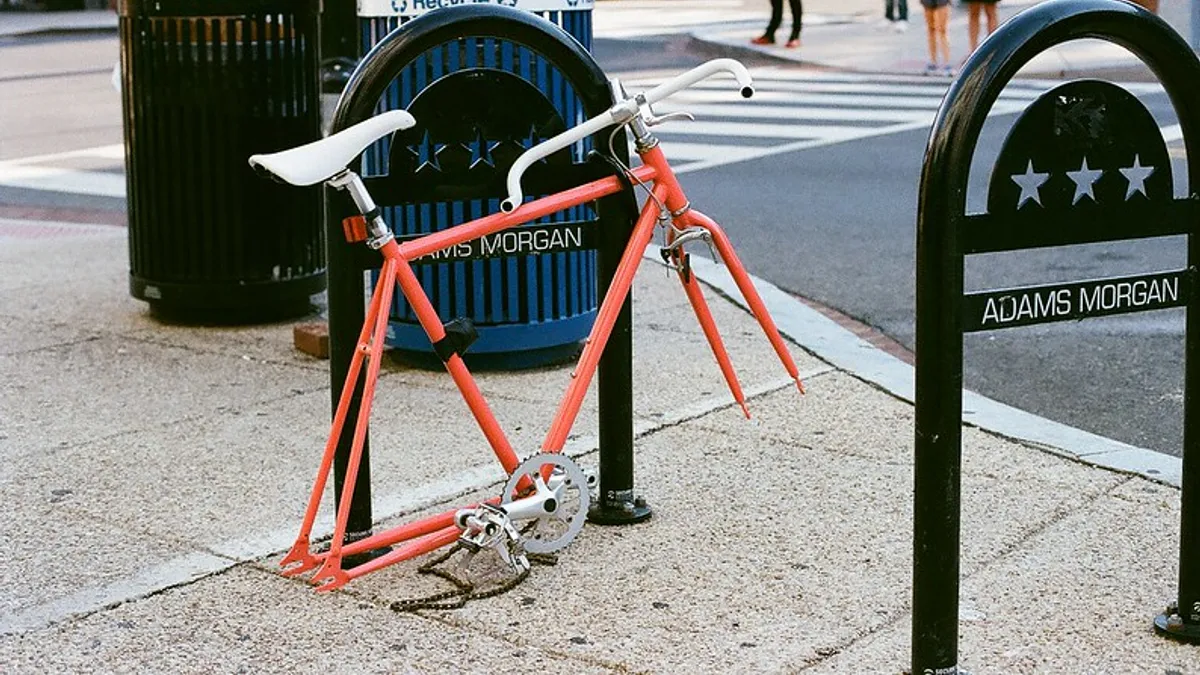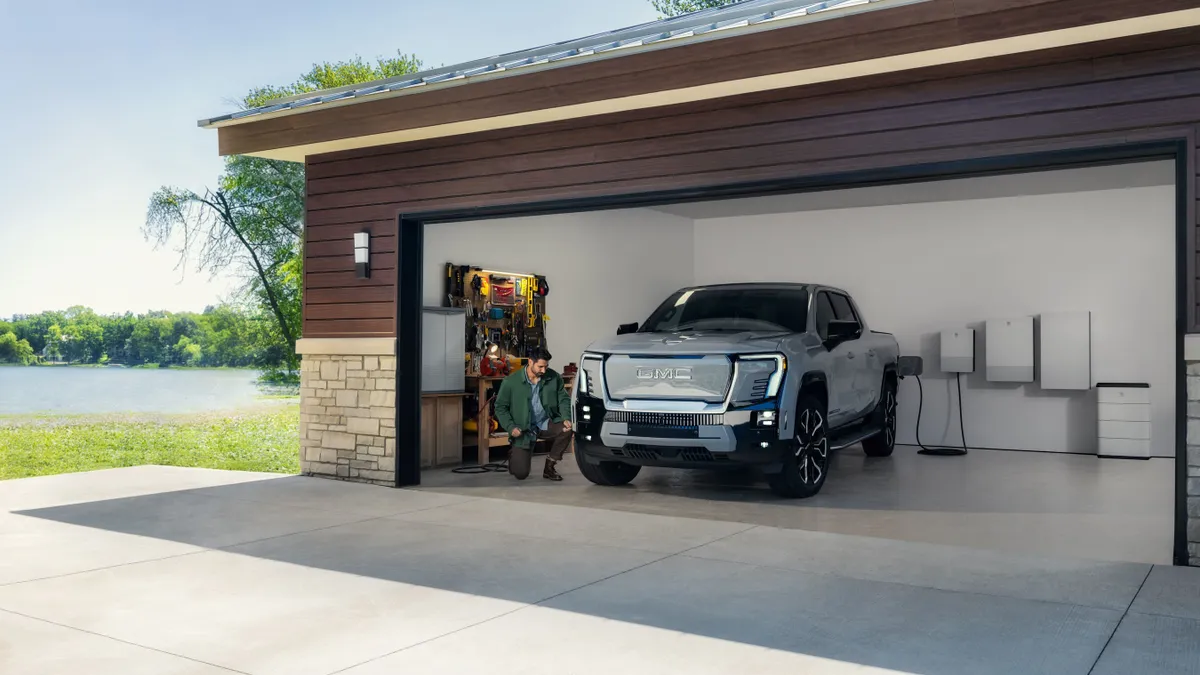Ian Kennedy, executive director of the Downtown Columbia Arts and Culture Commission in Maryland, is an avid cyclist with multiple two-wheeled steeds to his name. Among his favorite activities is mountain biking with his daughter, who has inherited his love of the sport.
After a morning spent riding together this fall, the two packed their bikes into their van and returned home, parking on the street in front of the house. Unfortunately for Kennedy, he had neglected to lock the van doors. Later that evening, the rear van door was found ajar with the bikes missing, making the Kennedys a statistic in a rapidly growing trend during the COVID-19 pandemic: bike theft.
As Americans increasingly opt for alternative forms of commuting and traveling amid the health crisis, U.S. bike sales have skyrocketed, with April alone seeing a 75% spike in sales over 2019 numbers. Theft rates have risen alongside these sales, increasing by 68% between March and September, according to Bryan Hance, co-founder of registry organization Bike Index.
In an era where all cities are cash-strapped, it may be difficult to prioritize bike theft mitigation. With bigger issues and crimes on their plates, city managers and adjacent police departments often don’t have the manpower or funding to focus on what is considered a very low-level, low-value crime.
But this runs incongruous to the money and effort many municipalities are investing in making their regions bike-friendly. If citizens don’t have trust that they can safely park their bikes — or retrieve them if stolen — they may be less likely to utilize the bike lanes and greenways that so many cities have spent big dollars to create.
Efforts to mitigate bike thefts can start with one invested police officer who dedicates a few hours of time each week to the crimes. In some cases, police departments create task forces to focus on the issue. And when approached with the right set of tools and dedication, some are putting a dent in the problem.
'You can't arrest your way out of this'
Stealing a bike is often incredibly easy — and is often a crime of opportunity. "The bad guys are better organized than the good guys," said J Allard, creator of Project 529, a bike registry and theft reporting tool. "The thieves know they have many things working in their favor."
One of those advantages is that only one in 10 bike owners on average even report their bikes as stolen, according to Dave Sanders, an officer in the Central Precinct Bike Unit in Portland, OR. Bike theft can also provide a quick and easy get-away vehicle, making it a secondary crime in many instances.
"I actually saw someone riding my daughter’s bike a week later,” said Kennedy of his experience. “I said something to him and he took off. There was nothing I could do.”
This black market is thriving as a multi-billion-dollar industry in and of itself, according to Allard. Thieves often turn to sites like Craigslist or Facebook Marketplace to sell their stolen treasures, enabled by the fact that owners often have no concrete method for claiming ownership of the bikes outside of comparing serial numbers — if they even have documentation of that number. Other problems include poorly designed bike locks, or user error in bike locking — such as securing a bike tire but not the actual bike to a solid object like a light pole.
Portland has a particular reputation for bike thefts. Sanders said a conservative estimate of 2,500 bikes are stolen annually, but that number is likely higher as only one in four actually report the theft to the police. To address the widespread problem, the Portland Police Bureau formed a task force in 2015.
"There’s not dedicated funding or positions for it, but it’s a division within the department where about six of us are actively involved," said Sanders. "We all have other duties, but wear many hats."
He went on to highlight the importance of measures such as community education and engagement to make bike theft mitigation a cohesive effort. "We started by focusing on the perpetrators, but you can’t arrest your way out of this,” Sanders said.
Registration
The Portland Police Bureau's task force has evolved in its approach to addressing bike thefts over the last five years, focusing much of its attention on bike registration efforts, which Sanders said is critical. Every bike has its own serial number — much like a vehicle’s VIN number — but most bike owners have no idea of that. "This is a piece of the puzzle that has to be in place to change the problem," he said. 'It’s a long-term solution to the problem."
While Kennedy had registered his serial number and hoped that it might be picked up in the local department’s system, he hadn’t completed the process with his daughter’s bike. "The local police have access to a statewide database, so I at least had a shot at my bike turning up in a pawn shop or on a website," he said. “Ultimately we had no luck.”
The department has also partnered with Allard’s Project 529, which works with law enforcement, bike shops, bike advocacy groups and citizens. Upon buying a bike, an owner can register his or her bike serial number in the system, along with a photo. "If your bike is stolen, you go to the app and the word automatically spreads to the police and social media, broadcasting to a radius of six to nine miles," Allard explained.
Officer Rob Brunt of the Vancouver, B.C. police department is also a proponent of bike registry and works with 529. "Six years ago, I was assigned to the property office after a car accident," he said. "There I got to see how many stolen bikes the department had in its possession."
Brunt was amazed to see a complex conveyor system — which the city purchased at upwards of $750,000 — that managed the warehouse full of nearly 1,000 bikes. Like many cities, Vancouver sells the bikes at auctions, returning what Brunt estimates to be $1 million annual proceeds back into the city budget. "I’m a cyclist myself and saw an extremely rare and expensive bike in there," he said. "I decided I needed to help fix the problem."
Using 529, Brunt and his team helped register 1,300 bikes in its first five days of operation. "The average bike recovered costs around $700, and we know that for every 10 people whose bikes are stolen, two disengage and never ride again," he said. "If cities set aside $7,000 annually for a registry program like 529, that’s a huge savings."
Breaking barriers
The Milwaukee Police Department in 2018 created its Milwaukee Bike Theft Reduction Initiative (MKEBTR) to take a multi-pronged approach to bike theft. MKEBTR's dedicated website educates residents on how to properly lock their bike, register their bikes and report them when stolen.
Pre-pandemic, Captain Timothy Leitzke enjoyed getting into the community and talking face-to-face with citizens about these three pillars. “It’s essential to ensure the outreach efforts are equitable to all neighborhoods,” he pointed out. "Bikes are just as important in the lower income areas as those where bikes are often utilized for recreation."
Leitzke said the program was making headway until 2020 hit, "which has slowed us down quite a bit."
Services like BikeLink, which provide low-cost, secure storage for bikes, can be good resources for cities as they grapple with bike theft amid the pandemic. Jake Massler, public-private relationship manager for BikeLink, said the company manages sites in 95 jurisdictions, with San Francisco's BART system as one of its first partners.
“We’re in 39 stations there,” said Massler of the BART system, "and we’ve run numbers that show using one of our lockers is 25,000 to one times safer than parking on the street." While about 75% of BikeLink users are first mile/last mile commuters, Massler said the BikeLink service can be an integral resource for overall city bike usage.
Leitzke remains determined to chip away at the theft trend, but admits to frustrations. "Bike theft can be an underappreciated problem," he said. "Old paradigms often exist that serve as a barrier. But if you get the bad guy, properly lock your bike, report and register, it goes a long way."
Whether or not an uptick in bike usage will continue beyond the pandemic is anyone’s guess, but for cities looking to make the most of their cycling-friendly infrastructure, investing time and money into theft is a value proposition. "Bike theft is maybe the simplest problem to solve in a community," Sanders said. "It should be a bigger priority."



















